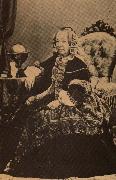|
Alma Tadema.org, welcome & enjoy!

|
|
Here are all the paintings of fredrika bremer 01
| ID |
Painting |
Oil Pantings, Sorted from A to Z |
Painting Description |
| 57761 |
 |
fredrika bremer pa ett foto fran amerikavistelsen,taget av den kande portrattfotografen brady. hon skrev ocksa reseskildringar fran europa och palesti |
mk260
fredrika bremer pa ett foto fran amerikavistelsen,taget av den kande portrattfotografen brady. hon skrev ocksa reseskildringar fran europa och palestina de ar,skrver sven stolpe |
| 57764 |
 |
i fredrika bremers skissbok fran resan till amerika finns den har techningen |
mk260
i fredrika bremers skissbok fran resan till amerika finns den har techningen,signerad st amalia estate 12 mars 1851. den visar en agave och som jamforelse av storleken har hon ocksa ritat av sig sjalv |
|
|
| fredrika bremer
|
| was a Swedish writer and a feminist activist.
Fredrika Bremer was born in Åbo (Turku) in Finland but moved with her family to Stockholm when she was three years old. She grew up in Stockholm and in the manor Årsta outside Stockholm. Her father was described as somewhat of a house tyrant, and her mother was a socialite, and she and her sisters where brought up to marry in to the aristocracy; a trip on the continent 1821-1822 was the finishing touch of her upbringing before her debute.
Bremer was not comfortable with this role, and was inflicted by a crisis, which she overcame by charitable work in the country around Årsta. In 1828, she debuted as a writer, anonomously, with a series of novels published until 1831, and was soon followed by others. Her novels were romantic stories of the time and concentrates on women in the marriage market; either beautiful and superficial, or unattractive with no hope of joining it, and the person telling the story and watching them is often an independent woman. She wanted a new kind of family life, not focused only on the men of the family, that would allow for women to develop their own talents and personality. By the 1840s, she was an acknowledged part of the culture life in Sweden and was translated to many languages. Politically, she was a liberal, but also felt symphaty for the socialism of the English working class movement
|
|
 All the Alma Tadema's Oil Paintings
All the Alma Tadema's Oil Paintings

Supported by oil paintings and picture frames

Copyright Reserved
|


